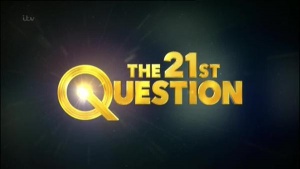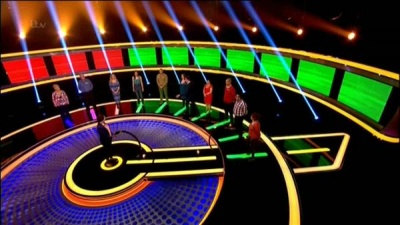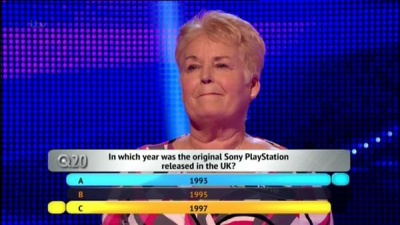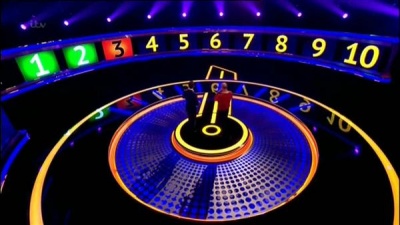The 21st Question
(To clarify: three right answers for half the prize fund, two more right answers for the full prize fund, and one final right answer for double the prize fund. That *is* how Gethin described it ;)) |
|||
| (11 intermediate revisions not shown) | |||
| Line 1: | Line 1: | ||
| + | [[File:The 21st question title.jpg|300px]] | ||
| + | |||
<div class="box"> | <div class="box"> | ||
| Line 7: | Line 9: | ||
== Broadcast == | == Broadcast == | ||
| - | Chocolate Media for ITV, 4 | + | Chocolate Media for ITV, 4 to 15 August 2014 (10 episodes in 1 series) |
</div> | </div> | ||
| Line 13: | Line 15: | ||
== Synopsis == | == Synopsis == | ||
| - | Eleven contestants play this quiz game | + | Eleven contestants play this quiz game. |
| - | + | For Question One, all eleven are on keypads, and work out five correct answers from ten. The fastest is allowed to choose their starting position from 1 to 10, or the Power Player in the middle. The second fastest picks from what's left, and so on. | |
| + | |||
| + | <div class=image> | ||
| + | [[File:The 21st question set.jpg|400px]] | ||
| + | ''Take your places, everyone.'' | ||
| + | </div> | ||
| + | |||
| + | The main body of the game starts with the one player on the Power Spot, the others stand in order around the edge of a circle. The players around the edge will face the central player in a series of duels. The duel is multiple choice questions. | ||
| + | |||
| + | The duel is won by whoever gives a right answer when their opponent is wrong. To take the Power Spot, the power player needs to make an error, and the player on the edge needs to be right. The duel ends early if the power player is right when the challenger is wrong. When the players can't be split after three questions, the power player wins by default. | ||
| + | |||
| + | The net result is that the power player has a sizeable advantage. If they can get the next nineteen questions right, they will win, and win very big. But the power player is vulnerable, they could leave the game at any time. | ||
| + | |||
| + | Eventually, one of the players will be knocked out. When this happens, the set shows off its gimmick. There's a path leading from the Power Player to the current player on the edge. The current player changes, and the path rotates to the new player, as does a backdrop behind the Power Spot. A nifty gimmick. | ||
| + | |||
| + | <div class=image> | ||
| + | [[File:The 21st question sample question.jpg|400px|The 21st Question]] | ||
| + | ''A sample (hard) question - regular questions are on a gold background.'' | ||
| + | </div> | ||
| + | |||
| + | For the power player, only right answers will put cash into the day's pot. £100 for each question in the first duel, £200 in the second, £300 in the third, and so on. There's nothing for a wrong answer. The power player may double up from question 7. This doubles the value of each question, and "doubles the difficulty". Rather than "easy - medium - hard", the questions become "hard - very hard - super duper hard". Challengers may double from question 14. | ||
| + | |||
| + | There are only 19 questions in the main body of the game. With a maximum of three per player, it's clear that position 7 on the circle is the last one assured of playing. They may only get one question, but will usually have three. At least two duels need to finish early for position 8 to play. | ||
| + | |||
| + | By the end, ten are eliminated, one player remains on the Power Spot. They play the titular 21st Question, looking for answers from the top ten in a certain category. For instance, "the ten longest-serving British prime ministers whose first term began in the 20th century". | ||
| + | |||
| + | Gethin first asks for three answers. If all of these are right, the player wins half of the day's prize fund, usually around £2000. If the player wishes, they can stop there and take the money. Or they can play on, and give two more answers: if both of these are right, they win the full prize fund, around £4000. Again, the player can stop. Or they can play on once more, and give one final answer: if ''this'' is right, they leave with double the prize fund, around £8000. A wrong answer at any stage means that the player leaves with nothing. | ||
| + | |||
| + | <div class=image> | ||
| + | [[File:The 21st question final.jpg|400px]] | ||
| + | ''Answers 1 and 2 have been found: is the third somewhere in the top ten?'' | ||
| + | </div> | ||
| + | |||
| + | Apart from the daily finalist, players come back throughout the week: everyone defeated on Monday will be back on Tuesday, and most of them will remain until Friday. This allows little narratives to develop through the week. | ||
| + | |||
| + | Two significant criticisms were made. One: they sometimes didn't give full answers to the list questions in the final round. That's easy to fix. Two: the show is slow, and many commentators found it to be unpleasantly slow. This appears to be baked into the show, and couldn't be fixed without a significant change. | ||
| + | |||
| + | == Inventor == | ||
| + | |||
| + | In the first episode, the credit was "Format devised by Alan Brown, Jack Burgess, Tom Hopgood, David Mortimer, Daniel Nettleton, Matt Tiffin, and Jamie Willcocks". Perhaps listing seven people was deemed overkill, so from the second episode onwards, the credit was simply "Format devised by Chocolate Media". | ||
| + | |||
| + | == Theme music == | ||
| + | |||
| + | Marc Sylvan | ||
== Trivia == | == Trivia == | ||
| - | + | Recorded at The London Studios. | |
| + | |||
| + | Aired as a 5pm summer replacement while [[The Chase]] took August 2014 off - its companion [[Gift Wrapped]] was scarcely less successful. | ||
| + | |||
| + | Answering the question in the picture: the Sony Playstation was originally released in 1995. | ||
| + | |||
| + | == Web links == | ||
| + | |||
| + | [http://en.wikipedia.org/wiki/The_21st_Question Wikipedia entry] | ||
| + | |||
| + | == See also == | ||
| + | |||
| + | [[Weaver's Week 2014-08-31|Weaver's Week review]] | ||
[[Category:General Knowledge Quiz|21st Question, The]] | [[Category:General Knowledge Quiz|21st Question, The]] | ||
| - | |||
| - | |||
Current revision as of 23:36, 26 December 2024
Synopsis
Eleven contestants play this quiz game.
For Question One, all eleven are on keypads, and work out five correct answers from ten. The fastest is allowed to choose their starting position from 1 to 10, or the Power Player in the middle. The second fastest picks from what's left, and so on.
The main body of the game starts with the one player on the Power Spot, the others stand in order around the edge of a circle. The players around the edge will face the central player in a series of duels. The duel is multiple choice questions.
The duel is won by whoever gives a right answer when their opponent is wrong. To take the Power Spot, the power player needs to make an error, and the player on the edge needs to be right. The duel ends early if the power player is right when the challenger is wrong. When the players can't be split after three questions, the power player wins by default.
The net result is that the power player has a sizeable advantage. If they can get the next nineteen questions right, they will win, and win very big. But the power player is vulnerable, they could leave the game at any time.
Eventually, one of the players will be knocked out. When this happens, the set shows off its gimmick. There's a path leading from the Power Player to the current player on the edge. The current player changes, and the path rotates to the new player, as does a backdrop behind the Power Spot. A nifty gimmick.
For the power player, only right answers will put cash into the day's pot. £100 for each question in the first duel, £200 in the second, £300 in the third, and so on. There's nothing for a wrong answer. The power player may double up from question 7. This doubles the value of each question, and "doubles the difficulty". Rather than "easy - medium - hard", the questions become "hard - very hard - super duper hard". Challengers may double from question 14.
There are only 19 questions in the main body of the game. With a maximum of three per player, it's clear that position 7 on the circle is the last one assured of playing. They may only get one question, but will usually have three. At least two duels need to finish early for position 8 to play.
By the end, ten are eliminated, one player remains on the Power Spot. They play the titular 21st Question, looking for answers from the top ten in a certain category. For instance, "the ten longest-serving British prime ministers whose first term began in the 20th century".
Gethin first asks for three answers. If all of these are right, the player wins half of the day's prize fund, usually around £2000. If the player wishes, they can stop there and take the money. Or they can play on, and give two more answers: if both of these are right, they win the full prize fund, around £4000. Again, the player can stop. Or they can play on once more, and give one final answer: if this is right, they leave with double the prize fund, around £8000. A wrong answer at any stage means that the player leaves with nothing.
Apart from the daily finalist, players come back throughout the week: everyone defeated on Monday will be back on Tuesday, and most of them will remain until Friday. This allows little narratives to develop through the week.
Two significant criticisms were made. One: they sometimes didn't give full answers to the list questions in the final round. That's easy to fix. Two: the show is slow, and many commentators found it to be unpleasantly slow. This appears to be baked into the show, and couldn't be fixed without a significant change.
Inventor
In the first episode, the credit was "Format devised by Alan Brown, Jack Burgess, Tom Hopgood, David Mortimer, Daniel Nettleton, Matt Tiffin, and Jamie Willcocks". Perhaps listing seven people was deemed overkill, so from the second episode onwards, the credit was simply "Format devised by Chocolate Media".
Theme music
Marc Sylvan
Trivia
Recorded at The London Studios.
Aired as a 5pm summer replacement while The Chase took August 2014 off - its companion Gift Wrapped was scarcely less successful.
Answering the question in the picture: the Sony Playstation was originally released in 1995.





